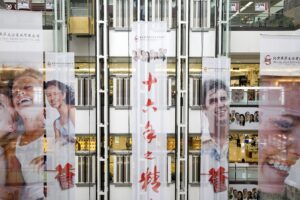Lovers of socially conscious photography can enjoy the creations of a Gustavus professor in far-flung locations this summer and fall. Priscilla Briggs, Art and Art History and Film and Media Studies, is showcasing her work at London’s Saatchi Gallery through September 17 as part of an exhibition called, “Civilization: The Way We Live Now.” Briggs is featured alongside about 150 fellow photographers from all over the globe in an installation that “highlights the complexity and contradictions of contemporary civilization.”

The specific photo in the London exhibit—”Civilization” has been touring the globe for several years—was shot in China, where Briggs has traveled to document how the communist country’s relatively new systems of capitalism “intersect East and West in terms of ideology, and how that’s manifested in the retail landscape,” she said. (The installation has an accompanying book that compiles its photos.)
Beginning in August, the Candela Collection, based in Richmond, VA will host the 12th edition of its UnBound! exhibit, which supports photographers by selling their original works and encourages their donation to notable permanent collections. For this, Briggs is including “Dollars and Sense: a zine about Capitalism,” which, like much of her work, explores societal divides, in this case by comingling statistics and narratives about wealth and poverty with images from the 2020 social justice protests. It’s one of multiple zines Briggs has helped create to dissect how consumerism influences social justice, the environment, and overall equity.
“The gold [pages] are about wealth and how that’s accumulated in the United States in various sectors of the economy, and then the black [pages are] about poverty and or death related to poverty and how that comes about,” she said.
Briggs will be on sabbatical this fall and will spend part of that time photographing organic farms in Italy after doing the same this summer here in Minnesota. Although she hasn’t yet identified specific end goals for that project, it was partly inspired by her father, an organic farmer in Pennsylvania. “A lot of the work I’ve done is looking more at one critical side of things, so I wanted to look at sustainable farming as a solution rather than focus on a problem,” she said. “Usually when I start a project, I’m not exactly sure what it’s going to lead. I just start with an idea of what I want to investigate and then the conceptual foundation of that will evolve into something.”